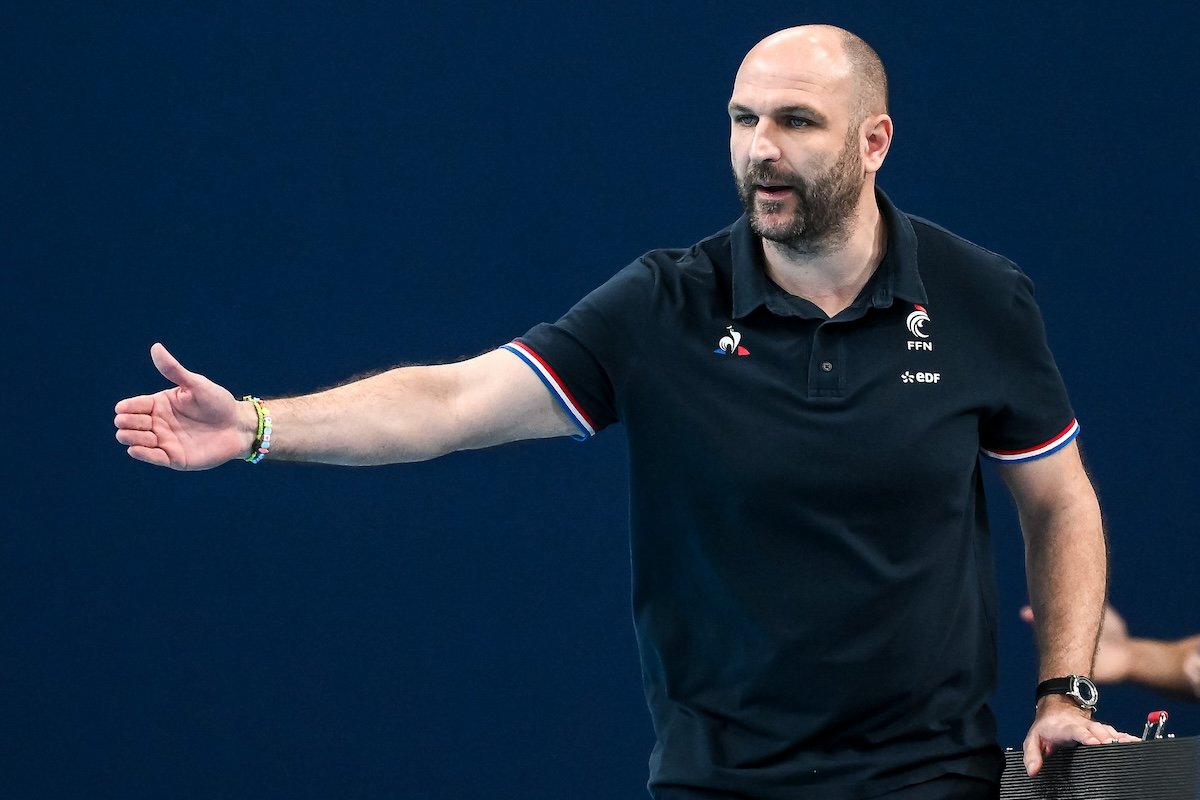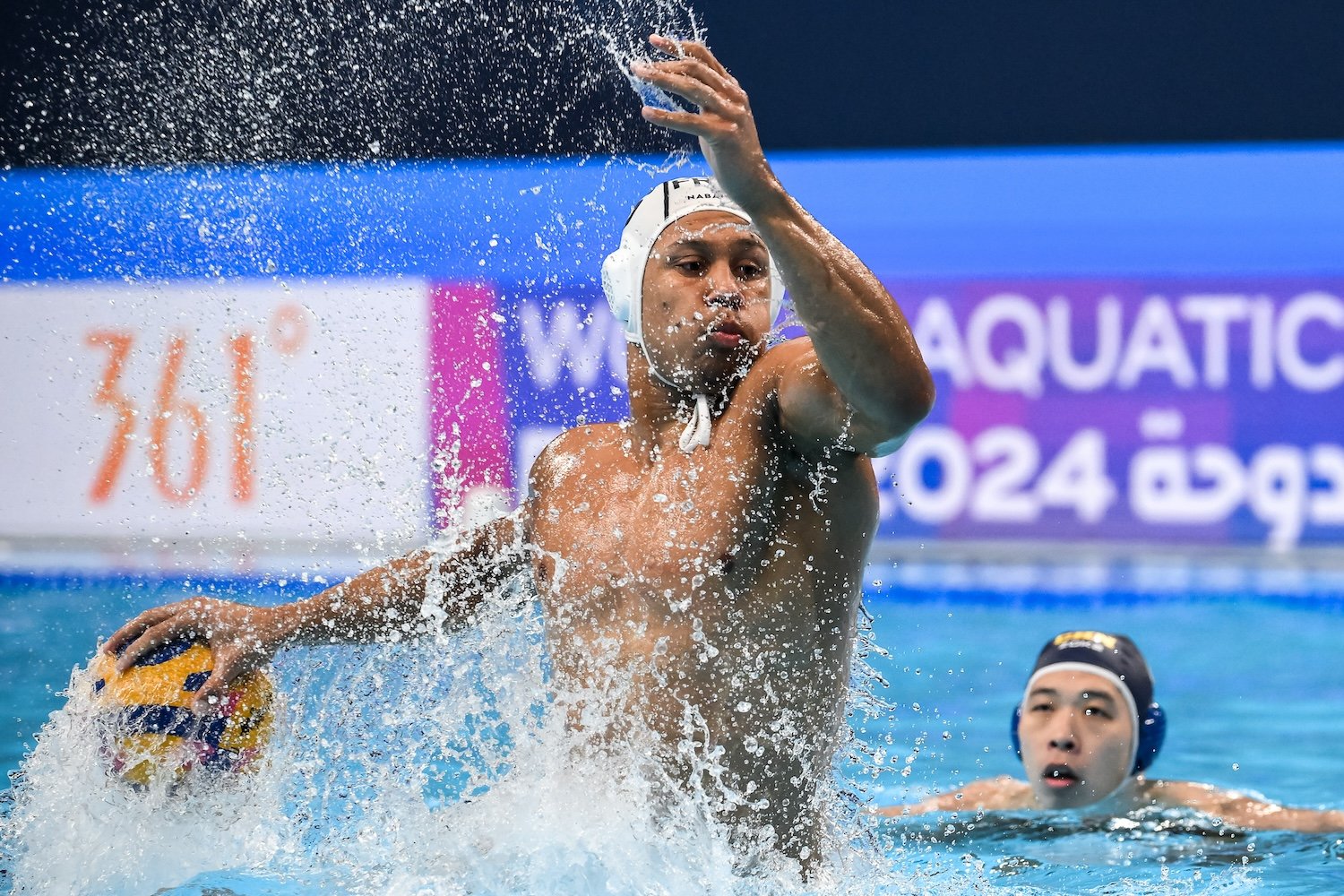Florian Bruzzo, French Men’s Coach: An Ambitious, Resilient Team Ready for Paris
Florian Bruzzo, French men’s head coach and architect of the team’s success in the run-up to the Paris Games. Photo: DeepBlueMedia
I’ve recently been focused on the French men’s water polo team, the result of a profile on Thomas Vernoux, a 21 year-old superstar. This is not a new fixation; I first noticed there was something up in France with the arrival of Baptiste Oliveri four years ago at St. Francis Brooklyn. Generously listed at 6-0, Oliveri is a skilled, savvy attacker with a knack for scoring big goals. He was one of the catalysts of a Terrier squad that consistently beat a talented Harvard, including twice in the Northeast Conference tournament, when SFC surprisingly advanced to conference finals in 2021 and 2022.
[How Sweet It Is! St. Francis Upsets Harvard at 2021 NWPC Tournament]
If the French club system could produce talented players like Oliveri, who are showing up on mid-level NCAA squads, what might they be doing at the national team level?
As it turns out, amazing things; so much so that in three short years a nation that did not qualify for the 2020 Tokyo Olympics is an outside threat to medal at the 2024 Games in Paris.
Clearly, it’s not just Oliveri—who is not a prospect for their men’s national team—that has boosted French water polo in advance of their Olympics, which open in a week. The Vernoux family is symbolic of France’s rapid elevation of polo; there’s Thomas and his cousin and teammate Romain Marion Vernoux on the men’s side, and Ema Vernoux, on the women’s side —who just signed to play college ball at Hawai’i.
Thomas Vernoux. Photo: DeepBlueMedia
The architect of this success is Florian Bruzzo. He coached the men in Rio at the 2016 Olympics, where they finished 11th. He switched to steering the women’s program when neither team qualified for the Tokyo Olympics, then switched back to the men in preparation for France hosting the XXXIII Olympiad. Bruzzo has spent the past eight years—ever since Paris was awarded the Games in 2016—preparing for this moment.
What follows is an interview with Bruzzo sent to me by the French Swimming Federation—in French! It’s NOT what I expected but it reveals how Bruzzo thinks, and why his French men have a realistic chance to finish in the upper half of the Olympic draw for the first time since 1948.
[This interview between Bruzzo and a FFN official has been translated from the original French and been edited]
- How would you describe your team?
It's an ambitious team, one that will be frank with each other. They are also resilient. They accept a lot of things.
- What are your goals for this year?
We're having a good year, but it's not over yet. To summarize, the European Championship and World Championship went well, they were the performances we had hoped for but not imagined.
Fourth place at the World Aquatics Championships that was not expected.
We are interested in developing the game through the quality we produce. We know it is this quality that will or will not make the result we hope for in Paris.
- We know all your athletes are training hard before the Olympic games. What is your goal at the end of the preparation?
For the final preparation, we tried to add another 10% to 15% on our performance. Obviously what [the team] liked least was physical preparation—so we came out with a big block of physical preparation. It was intense.
Vernoux and his French teammates jump in. Photo: DeepBlueMedia
Beyond the classic physical preparation we also focus on the efficiency and economy of gestures and the hierarchy of intention—here I am using big words but in reality we try to develop in the players their ability to swim quickly and that it costs them less mentally and physically—so that they keep their heads fresh to make the best decisions with the ball.
This is what we have unlocked the past three years. The first step was to be ambitious and to take responsibility for it and to show [the players] that they are capable of beating the best teams in the world… and today we beat all the best teams of the world.
- Are those moments important before Paris?
Yes because they know hard work will pay off—and this is the reason they’ve had [positive] results these past three years. They are rewarded by their performance; it is a virtuous circle that has been set up.
[The results have been impressive; sixth place in the 2022 European Championships, sixth in the 2022 World Aquatics Championships; fourth in the 2023 World Aquatics Championships.]
- You fought for the recognition of water polo in France.
We are convinced [water polo is] an attractive sport, a friendly sport. Anyone who comes to see a water polo match will leave impressed by the spectacle—the technology, the impression produced by beautiful swimming pools.
French women’s team applaud their fans after an exhibition match vs the USA. Photo: KMSP
We know the results of the national team are linked to the opening of the sport to the general public. For water polo enthusiasts or for [those] initiated to water polo for the first time, we have developed a game with skillfulness. It is not a brutal frontal game; we have the ability, with a lot of mobility and a lot of intention on defense.
- What do you mean by “responsibilities” for you and your staff?
A project which we accept is that everyone takes a different path—but we all want the same objective. The word “responsibility” is something we talk about a lot with [the players]. I always bring them back to their responsibilities. We tend to build a whole bunch of bad vibes around us to explain why and how it's not going to work. I am involved in the accountability of all the guys but also the accountability of the staff, responsibility of the clubs. [I] make the federation responsible; everyone is responsible for their part of their competence.
If everyone does their job in the end [we give] great performances.
Since 2016 we have broken down psychological barriers whether for the leaders, for the coaches, for the young athletes, because they saw a French team that won. Eight years ago it was the supreme objective of Paris 2024 to find the players [for] the French team; there was an effort from the clubs, from the federation on the structuring of the financing—particularly on HR additional skills.
- We hear you have a rules list, what is it?
It's a moral contract between [athletes] so obviously I'm going to take a look at it, but I'm at the end of the chain. It belongs to the group of leaders, then have it validated by the whole of the group—then they present it to me to see if we all agree on this.
It is a charter because we know that in an Olympic village we can very very quickly get lost. It's good that we find ourselves around common [ground].
- Your team has a similarity to the 1992 French handball team in Barcelona.
1992 is what gave me the desire to do the Olympics. I was 10 years old and so I remember [Thierry] Perreux and the Barjots team. The time in ‘92 in terms of structuring was a little crazy in good ways but that's how the story goes. I couldn't get too disappointed I wasn't with them.
French women’s team defend a shot by Jenna Flynn (#5). Photo: KMSP
[This is fascinating; most Americans have no idea what team handball is, though it’s a lot like water polo except not in the water but on a hardwood floor. The French men’s team won bronze in Barcelona.]
- How do you manage your group before the biggest event in their lives?
It's a competition that is obviously different, so we put in two - three ingredients that are different because it's going to be historic, and I want them to remember this. I also asked them to come out with the best preparation of their lives, the most efficient preparation of the three years which have just passed.
Honestly, we haven't changed a lot of things. We still have our routine. As we continue to move forward, we helped the guys be more ambitious in their preparation.
We pay particular attention to anxiety because we know it’s not obvious. I've already [boxed out] a few days off; as a coach I've already experienced this.
[Playing in] the Olympics it's not like the world championships. And I think they understood: it's not the 13 best Frenchmen going to the Olympics, it’s the best 13 in the world.





